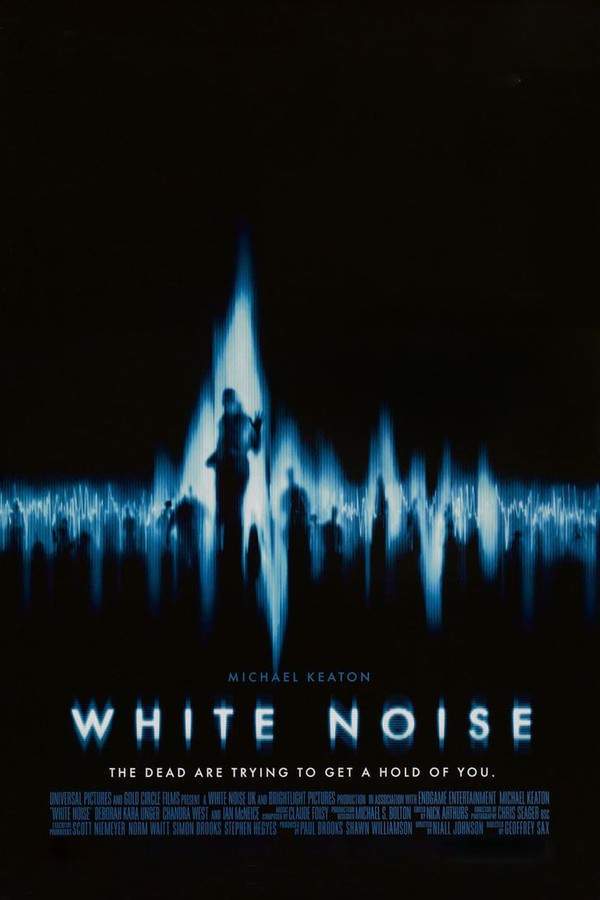White Noise 2022

A quirky American family grapples with the everyday struggles of life while confronting existential crises and hidden secrets. They embark on a journey exploring the pursuit of happiness and meaning in a world filled with uncertainty and unexpected events. The film blends humor and drama as they navigate a chaotic and unpredictable reality.
Does White Noise have end credit scenes?
Yes!
White Noise does have end credit scenes. Stay until the very end!
Meet the Full Cast and Actors of White Noise
Explore the complete cast of White Noise, including both lead and supporting actors. Learn who plays each character, discover their past roles and achievements, and find out what makes this ensemble cast stand out in the world of film and television.

Greta Gerwig
Babette

Don Cheadle
Murray

Jodie Turner-Smith

Alessandro Nivola

Adam Driver
Jack

André Benjamin

Anna Sheridan

Carly Brodax
College on the Hill

Danny Wolohan
German Teacher

Douglas Brodax
College on the Hill

Gideon Glick

Jill Brodax
College on the Hill

Lars Eidinger

Laura Wimbels

Logan Fry

Madison Gaughan
College on the Hill

Matthew Shear

Michael Chopra

Michael William Chopra
College on the Hill

Mike Gassaway

Quincy Tyler Bernstine

Raffey Cassidy
Denise

Sam Nivola
Heinrich

Santu Chopra
College on the Hill

Thomas W Wolf

Wickham Bermingham
College on the Hill
External Links and Streaming Options
Discover where to watch White Noise online, including streaming platforms, rental options, and official sources. Compare reviews, ratings, and in-depth movie information across sites like IMDb, TMDb, Wikipedia or Rotten Tomatoes.
Ratings and Reviews for White Noise
See how White Noise is rated across major platforms like IMDb, Metacritic, and TMDb. Compare audience scores and critic reviews to understand where White Noise stands among top-rated movies in its genre.

The Movie Echo Score
White Noise delivers an ambitious adaptation that oscillates between moments of visual flair and narrative instability. Critics acknowledge occasional spectacular set pieces and strong performances, yet many note uneven pacing and a scattered storyline. User feedback leans heavily toward disappointment, citing disjointed dialogue and a lack of coherent payoff. The combined effect is a mixed impression that leans toward the lower end of the middle range.
The Movie Echo Score Breakdown for White Noise

Art & Craft
In terms of art and craft, the film offers striking visual design and occasional effective camera work. Reviewers praise the production design and some spectacular set pieces, while also noting an overall cautious direction that at times feels constrained. The editing and pacing are described as uneven, contributing to a moderate assessment of craftsmanship.

Character & Emotion
When evaluating character and emotion, performances by the leads receive commendation for their energy and nuance. Some critics highlight the actors' ability to elevate the material, yet audiences report stilted dialogue and a lack of chemistry in key moments. The mixed reactions result in a middling score reflecting both strong acting and notable shortcomings.

Story & Flow
The story and flow are widely seen as fragmented and confusing. Critics describe the narrative as mis‑measured and overly ambitious, while users repeatedly mention disorganized plotlines and a loss of focus. Despite occasional engaging first‑half moments, the overall lack of coherence and unsatisfying payoff depresses the story rating.

Sensory Experience
Sensory experience receives relatively positive feedback, with reviewers noting vivid cinematography, compelling set design, and a strong musical score. The film’s visual style is described as beautiful and its sound design effective, creating an immersive atmosphere even when other elements falter. This favorable perception lifts the sensory score into the higher range.

Rewatch Factor
Rewatch factor is low, as many viewers find the film exhausting and lacking lasting appeal. Critics and users alike point to its uneven tone and convoluted narrative, reducing incentive for repeat viewings. While a few cite brief moments of enjoyment, the overall consensus suggests limited replay value.

66
Metascore
5.5
User Score


64%
TOMATOMETER

33%
User Score

5.7 /10
IMDb Rating

55
%
User Score

3.0
From 212 fan ratings

3.50/5
From 2 fan ratings
Take the Ultimate White Noise Movie Quiz
Challenge your knowledge of White Noise with this fun and interactive movie quiz. Test yourself on key plot points, iconic characters, hidden details, and memorable moments to see how well you really know the film.
White Noise Quiz: Test your knowledge about the intriguing plot and characters of 'White Noise' from 2022.
What field does Jack Gladney specialize in at College-on-the-Hill?
Hitler studies
Cultural studies
Philosophy
Psychology
Show hint
Awards & Nominations for White Noise
Discover all the awards and nominations received by White Noise, from Oscars to film festival honors. Learn how White Noise and its cast and crew have been recognized by critics and the industry alike.
28th Critics' Choice Awards 2023
Best Song
38th Artios Awards 2023
Big Budget – Comedy
80th Golden Globe Awards 2023

Full Plot Summary and Ending Explained for White Noise
Read the complete plot summary of White Noise, including all major events, twists, and the full ending explained in detail. Explore key characters, themes, hidden meanings, and everything you need to understand the story from beginning to end.
In 1984, Jack Gladney (Adam Driver), a professor specializing in a unique subject he created—“Hitler studies”—teaches at the College-on-the-Hill in Ohio. Despite his expertise, he finds himself struggling with the German language and discreetly takes basic lessons to prepare for an upcoming conference speech.
Jack shares his life with his fourth wife, Babette (Greta Gerwig), as they navigate the complexities of a blended family that includes Heinrich (Sam Nivola) and Steffie ([May Nivola]), his children from previous marriages, along with Denise (Raffey Cassidy), from Babette’s earlier relationship, and baby Wilder (portrayed by Henry and Dean Moore), their joint child. Although they lead what seems to be an ordinary life, Babette harbors concerns about the future, especially regarding how their children will cope once they grow up and move out.
Intriguingly, Denise becomes suspicious when she discovers Babette’s hidden stash of a mysterious drug called Dylar, which raises concerns since it doesn’t appear in standard prescription records. Meanwhile, Jack starts having unsettling dreams about an enigmatic figure attempting to kill him, echoing a previous conversation with Babette about their shared anxiety surrounding mortality. His colleague, Murray Siskind (Don Cheadle), a professor passionate about American culture, wishes to carve out his niche with “Elvis studies” and persuades Jack to join him in promoting their respective courses, leading to spirited debates about the parallels between Elvis and Hitler’s childhood experiences.
As Babette’s memory begins to falter, Denise reveals her concerns to Jack, highlighting that the drugs might be a factor. However, everything spirals when a catastrophic train accident releases a cloud of toxic chemicals over their town. Initially dismissive of any danger, Jack attempts to reassure his family that they will be safe from this so-called Airborne Toxic Event, which turns into widespread evacuation as the toxic cloud approaches. Caught in gridlock while trying to leave, they find their vehicle low on fuel and become increasingly desperate.
During the chaos, while seeking gas, Jack inadvertently exposes himself to the toxic cloud. Soon, their family is confined in a summer camp, where Denise tells Jack of his exposure. This leads to a grim realization that while they are currently safe, potential health impacts from the chemical exposure may not surface for decades. With escalating panic at the camp as families attempt to escape, the Gladneys find themselves in a precarious situation when their vehicle becomes trapped in a river.
After migrating to Iron City and confronting a man adamant about the media ignoring their plight, the family finally returns home weeks later, only for Jack to find his fears of death heightened due to his exposure. While life appears to stabilize, Babette morphs into a shell of her former self, appearing frail and emotionally detached.
Jack begins experiencing unsettling hallucinations of a balding man who seems to be shadowing him. Concerned about Babette’s condition, Denise shares her worries regarding the effects of Dylar. Upon confronting Babette, Jack learns that the drug is experimental and was part of a clandestine clinical trial aimed at treating the fear of death. After enduring a few months of a disgraceful arrangement to maintain access to the drug involving a shadowy figure known as Mr. Gray, Babette’s struggles come to light.
Fueled by curiosity and rage, Jack embarks on a quest to confront Mr. Gray. Ultimately, he discovers that this elusive figure is the very man tormenting his mind and, in a dramatic twist, Jack shoots him, placing the weapon to create a facade of suicide. Yet, their confrontation escalates, resulting in both Jack and Babette suffering injuries. After a sequence of mind-bending events, including their reconciliation, they end up at a peculiar hospital run by German atheist nuns.
In a heartwarming finale, the Gladneys re-enter a semblance of normalcy, shopping at their local A&P supermarket, where they find joy in dancing alongside other patrons, indicating that amid chaos, the simplicity of life still prevails.
Uncover the Details: Timeline, Characters, Themes, and Beyond!

Coming soon on iOS and Android
The Plot Explained Mobile App
From blockbusters to hidden gems — dive into movie stories anytime, anywhere. Save your favorites, discover plots faster, and never miss a twist again.
Sign up to be the first to know when we launch. Your email stays private — always.
Watch Trailers, Clips & Behind-the-Scenes for White Noise
Watch official trailers, exclusive clips, cast interviews, and behind-the-scenes footage from White Noise. Dive deeper into the making of the film, its standout moments, and key production insights.
White Noise Themes and Keywords
Discover the central themes, ideas, and keywords that define the movie’s story, tone, and message. Analyze the film’s deeper meanings, genre influences, and recurring concepts.
White Noise Other Names and Titles
Explore the various alternative titles, translations, and other names used for White Noise across different regions and languages. Understand how the film is marketed and recognized worldwide.
Similar Movies To White Noise You Should Know About
Browse a curated list of movies similar in genre, tone, characters, or story structure. Discover new titles like the one you're watching, perfect for fans of related plots, vibes, or cinematic styles.
Quick Links: Summary, Cast, Ratings, More

What's After the Movie?
Not sure whether to stay after the credits? Find out!
Explore Our Movie Platform
New Movie Releases (2025)
Famous Movie Actors
Top Film Production Studios
Movie Plot Summaries & Endings
Major Movie Awards & Winners
Best Concert Films & Music Documentaries
Movie Collections and Curated Lists
© 2025 What's After the Movie. All rights reserved.

































